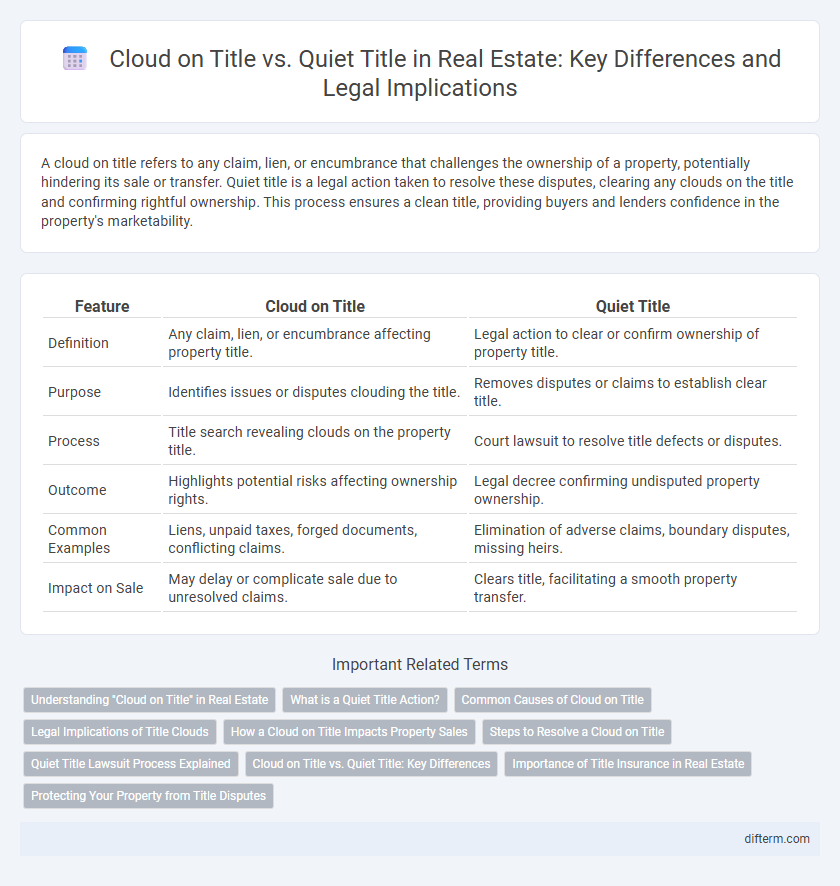A cloud on title refers to any claim, lien, or encumbrance that challenges the ownership of a property, potentially hindering its sale or transfer. Quiet title is a legal action taken to resolve these disputes, clearing any clouds on the title and confirming rightful ownership. This process ensures a clean title, providing buyers and lenders confidence in the property's marketability.
Table of Comparison
| Feature | Cloud on Title | Quiet Title |
|---|---|---|
| Definition | Any claim, lien, or encumbrance affecting property title. | Legal action to clear or confirm ownership of property title. |
| Purpose | Identifies issues or disputes clouding the title. | Removes disputes or claims to establish clear title. |
| Process | Title search revealing clouds on the property title. | Court lawsuit to resolve title defects or disputes. |
| Outcome | Highlights potential risks affecting ownership rights. | Legal decree confirming undisputed property ownership. |
| Common Examples | Liens, unpaid taxes, forged documents, conflicting claims. | Elimination of adverse claims, boundary disputes, missing heirs. |
| Impact on Sale | May delay or complicate sale due to unresolved claims. | Clears title, facilitating a smooth property transfer. |
Understanding "Cloud on Title" in Real Estate
A cloud on title in real estate refers to any claim, lien, or encumbrance that may invalidate or impair the rightful ownership of a property, such as unresolved mortgages, unpaid taxes, or legal disputes. Clearing a cloud on title is essential to ensure a clear and marketable title, often requiring legal action like a quiet title lawsuit to resolve conflicting claims. Understanding and addressing clouds on title protects buyers, sellers, and lenders by securing a definite and undisputed property ownership record.
What is a Quiet Title Action?
A Quiet Title Action is a legal proceeding used to establish clear ownership of real property by resolving disputes or removing clouds on the title. It effectively eliminates any conflicting claims, liens, or interests that may affect the property's title, ensuring the owner's rights are undisputed. This process is essential for securing marketable title and facilitating smooth real estate transactions or financing.
Common Causes of Cloud on Title
Common causes of cloud on title include unresolved liens, unpaid property taxes, and competing claims from previous owners or heirs. Mistakes in public records, such as incorrect property descriptions or recording errors, often result in disputes that hinder clear ownership. Identifying and addressing these issues is crucial for obtaining a quiet title and ensuring free and clear property ownership.
Legal Implications of Title Clouds
Cloud on title refers to any claim, lien, or encumbrance that may impair the ownership rights of a property, potentially causing legal disputes and affecting the property's marketability. Quiet title actions serve as a legal remedy to resolve these disputes by establishing clear ownership and removing clouds on the title through court judgment. Failure to address clouds on title can result in prolonged litigation, difficulty in securing financing, and challenges in transferring property ownership.
How a Cloud on Title Impacts Property Sales
A cloud on title creates legal uncertainties that can delay or derail property sales by casting doubt on ownership rights. Lenders and buyers often require a clear title to proceed with financing and transactions, making it crucial to resolve any clouds through quiet title actions. Clearing these disputes ensures marketable title, enhancing property value and facilitating a smooth transfer of ownership.
Steps to Resolve a Cloud on Title
Resolving a cloud on title involves identifying the conflicting claim, gathering all supporting documents, and filing a quiet title lawsuit to clear ownership rights. Property owners must serve notice to all parties with alleged interests, followed by a court hearing to validate rightful ownership. Once the court issues a judgment, the cloud is removed from the title, allowing for clear and marketable property transfer.
Quiet Title Lawsuit Process Explained
A quiet title lawsuit is a legal action used to clear property ownership disputes by establishing a party's rightful claim to real estate, removing any clouds on the title. The process involves filing a complaint, notifying all potential claimants, and obtaining a court judgment that confirms clear title. This lawsuit helps resolve issues such as boundary disputes, unclear ownership, or competing claims, ensuring a clean, marketable title.
Cloud on Title vs. Quiet Title: Key Differences
Cloud on title refers to any claim, lien, or encumbrance that affects the clear ownership of a property, potentially complicating its transfer or legal status. Quiet title is a legal action taken to resolve disputes and remove clouds on the title, thereby establishing clear ownership with no competing claims. Understanding these differences helps buyers and sellers ensure a property's title is free from defects and marketable.
Importance of Title Insurance in Real Estate
Title insurance protects property buyers and lenders from potential title defects or disputes, ensuring ownership rights are secure despite clouds on the title or unresolved claims. A cloud on title indicates possible legal questions affecting ownership, while a quiet title action legally resolves these disputes to clear the ownership record. Securing title insurance is critical in real estate transactions to shield against financial loss and provide peace of mind by confirming clear and marketable title.
Protecting Your Property from Title Disputes
Cloud on title refers to any claim, lien, or encumbrance that may affect ownership rights, creating uncertainty or disputes about the property's legal status. Quiet title actions are legal proceedings used to remove these clouds, establishing clear and undisputed ownership by resolving conflicting claims. Protecting your property from title disputes involves regularly conducting title searches and pursuing quiet title suits when necessary to ensure marketable and defendable property rights.
cloud on title vs quiet title Infographic

 difterm.com
difterm.com